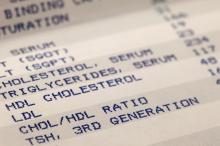Cholesterol: The Low Down

This post is an installment in our 52 Health Hinges series. Remember, “Small hinges swing big doors.”
Conventionally, cholesterol is most often discussed in terms of having “high cholesterol.” This week, let’s turn the tables and ask if it’s possible for cholesterol levels to be too low?
The short answer is yes.
To understand why, let’s review what we’ve already discussed about cholesterol, which is:
- Essential for good health
- A necessary component of every cell in your body
- Critical for balanced hormones
- Protects against the stress of everyday life
- Necessary for making all of the body’s sex hormones
- Essential for the use of Vitamin D
- Key in supporting a healthy brain
- Important for digestive function
Finally, my favorite cholesterol benefit (if it’s possible to have a favorite?) - it’s critical for the repair of damaged cells.
So…in light of all of those benefits, does it stand to reason that low cholesterol is not anything to strive for?
I think so.
Low cholesterol is associated with:
- Memory loss
- Depression
- Disruption in the production of hormones
- Increased risk of cancer
- Low production of Vitamin D
- Increased risk of early death in elderly
- Premature births and lower birth weights
The functional medicine community considers total cholesterol below 150 to be low.
On a related topic, I received a reader question asking if it’s possible to have a triglyceride level that’s too low.
According to Dr. Joseph Mercola, “Triglycerides are the chemical form of fat found in foods and in your body. When you eat a meal, any unused calories are converted to triglycerides and stored in your fat cells (some triglycerides are also present in your blood stream).”
As I closed last week, elevated blood levels of triglycerides are actually a better predictor of heart disease vs. total cholesterol.
Okay…so can triglycerides be too low? Yes. If your levels are under 60, you could be hypoglycemic.
Insulin is a foundational hormone, so it’s critical to get your blood sugar levels in check to promote overall health. The majority of your cholesterol is produced by your liver, which is influenced by your insulin levels. Optimize your blood sugar = optimize your cholesterol.
If total cholesterol is not a reliable indicator of heart disease, what’s better?
According to Dr. Liz Wallace, the combination of high triglycerides and low HDL are more effective markers for heart disease than total cholesterol and LDL cholesterol.
As with everything, I want to dig for why this is the case.
Let’s define HDL and LDL. You’ve likely heard of these referred to as “good” cholesterol and “bad” cholesterol, but you may not know what each of these does in your body (and once you learn, I hope you’ll agree that neither is “good” or “bad”).
Seventy-five percent of your cholesterol is manufactured in your liver. LDL, or low-density lipoproteins, transports the cholesterol from your liver to other cells. Your cells need it for various reasons (see above), but in this case let’s use my favorite purpose – the cholesterol is being summoned to help repair damage in your body. It’s almost like little firemen called to the scene of a fire.
Next, let’s talk about HDL, or high-density lipoproteins. These lipoproteins act like scavengers in your body; they’re like little garbage trucks that travel around your body picking up the cholesterol used by your cells and transport it back to your liver for disposal.
If you have low HDL, it may not be able to pick up all the cholesterol out on a repair call, so the LDL is left to oxidize in the artery. And this is where the problem begins.
To truly impact heart health favorably, you need to dig for why the artery was damaged resulting in a need for repair, and solve that problem. Blaming cholesterol in this case is like blaming the firemen for the fire, just because they showed up at the scene.
So, now that you’ve got the context, do you believe that cholesterol is inherently bad?
To close out this miniseries on cholesterol, let’s come full circle back to the egg with this great quote from Chris Masterjohn, PhD:
“Egg yolks are indeed full of cholesterol. Like most cholesterol-rich foods, they are jam-packed full of important nutrients, especially the fat-soluble vitamins and essential fatty acids.
“In fact, the slew of nutrients in an egg yolk is so comprehensive that a few a day would offer better insurance than a multi-vitamin. Most importantly, the yolk contains most of the nutrients in an egg.
“Egg whites, on the other hand, contain far fewer nutrients. The only thing that could justify their consumption is their attachment to their companion yolk.”
So enjoy your yolks, folks!
Add comment